#Love Calcutta India
Explore tagged Tumblr posts
Text
Brazilian footballer Ronaldinho will visit Kolkata and unveil a Messi statue at the Durga Puja pandal
Brazil’s World Cup footballer Ronaldinho will make his lady visit to Kolkata in front of Durga Puja and meet Chief Minister Mamata Banerjee to gift her a jersey. The three-time Ballon d’Or victor will likewise initiate the puja at Sree Bhumi Brandishing Club, where a 75-ft sculpture of Argentine World Cup champ Lionel Messi has been developed as a feature of the mandap. The previous Brazil…

View On WordPress
#Barcelona#Chief Minister#Diego Maradona#Durga Puja#Lionel Messi#Love Calcutta India#Love Calcutta India News#Madrid#Mamata Banerjee#Messi#Pele#Ronaldinho#Sourav Ganguly#Spain
0 notes
Text

বাঙালির দূর্গা পুজো
#aesthetic#durga pujo#durga puja#durga#ma durga#photography#moodboard#writing#bengali#bong#desi#desi tag#desiblr#being desi#kolkata#calcutta#love#india#art#art for the sake of art#joy#happy#festival#puja#mahalaya#beauty#dark academia#messy layouts#indian#heritage
96 notes
·
View notes
Text
met a VERY drunk welsh boy trying to find his way back into town & im SO happy for him as a person bc he’s … we were on the same page …. ENGLAND HATERS FOREVER
#stream#ALSKALSKALSKLAKDLAKDLAJDLA#he started speaking welsh he was so fuckign funny then i was w raid & bisha & then he was like where r y’all from ethiopia & india & then he#was like my sisters bf is from calcutta too he’s the best ALSKALSKAKKSLSKSLA he was so funny but he has so much like empathy i guess like He#Understands bc he’s from the MOUNTAINS#NOT EVEN THE VALLEYS GIRL THE MOUNTAINS so he’s like ‘outsider’ so idk the mentality just rides bc he didn’t lean english until he was 12#LIKE IT WAS WELSH ONLY 😭😭😭😭#KING#forever love wales#but also i hate britain so#must be said#BUT WALES ❤️❤️❤️❤️#it’s just the south but of the uk#i love it truly
3 notes
·
View notes
Text
Saint Teresa of Calcutta: The Saint of the Slums
I am deeply emotional when it comes to talk for a great woman like Mother Teresa. Not only because she is Albanian like me, but because I’ve experienced myself the tremendous influence and love Catholics around the world had for her figure. In one of my visits in Malawi in Africa, I participated in a gathering of clients of a microfinance bank there. As I was a guest the speaker introduced me as…
#Acts Of Kindness#Albanian Saint#Beacon Of Hope#Calcutta India#Faith In Action#Global Humanitarian#Gonxhe Bojaxhiu#Hope For The Poor#Icon Of Charity#Inspire With Love#Kolkata India#Legacy Of Love#Living With Love#Missionaries Of Charity#Mother Teresa#nobel prize for peace#Nobel Prize winner#Pope Francis#Saint Of The Slums#Saint Teresa Of Calcutta#Selfless Service#Serving The Needy#Spiritual Legacy
0 notes
Text

Happy Rabindranath Tagore Jayanti
@xicoindia_ provides a Permanent Residency that empowers a foreign national to reside and work indefinitely in a country of which he is not a citizen.
XICO INDIA MANAGEMENT PRIVATE LIMITED is a private limited Indian company based in Delhi, India, The company is based in the city of Delhi.
Call us for FREE consultation and make your Overseas Career Dream a reality. Call: 011 4984-9440
WhatsApp: +91 8744918449 Email: [email protected]
#rabindranathtagore#tagore#rabindranath#kolkata#rabindrasangeet#india#bengali#poetry#art#shantiniketan#love#santiniketan#rabindrajayanti#rabindranathtagorequote#rabindranathtagorejayanti#music#instagram#calcutta
0 notes
Photo

Kali
Kali is the Hindu goddess of death, time, and doomsday. She is often associated with sexuality and violence but is also considered a strong mother figure and symbol of motherly love. Kali embodies shakti – feminine energy, creativity and fertility – and is an incarnation of Parvati, wife of the great Hindu god Shiva.
Kali is most often represented in art as a fearful fighting figure with a necklace of heads, skirt of arms, lolling tongue, and brandishing a knife dripping with blood.
Name & Worship
Kali's name derives from the Sanskrit meaning 'she who is black' or 'she who is death', but she is also known as Chaturbhuja Kali, Chinnamastā, or Kaushika. As an embodiment of time Kali devours all things, she is irresistibly attractive to mortals and gods, and can also represent (particularly in later traditions) the benevolence of a mother goddess.
The goddess (devi) is particularly worshipped in eastern and southern India and specifically in Assam, Kerala, Kashmir, Bengal – where she is now worshipped in the yearly festival of Kali Puja held on the night of a new moon – and in the Kalighat Temple in the city of Calcutta.
Continue reading...
112 notes
·
View notes
Text
DAY 5926
Jalsa, Mumbai May 9/10, 2024 Thu/Fri 12:22 AM
Birthday Greetings for May 10th , 2024
Saddened to hear the news of the passing away of Shri Ratan Lal Bhutoria , Father of our dear Ef Rohit Kumar Bhutoria .. Rohit's Father met with a road accident this morning and unfortunately could not survive .. as informed by Ef Sanjay Patodiya .. 😔🙏🏻 .. deeply shocked and grieved .. our very sincerest condolences to you , Rohit .. we hold your hand .. be strong .. the whole Ef Family with you .. in prayer and support .. 🙏🏻
..
Hard to put anything after this 💔 .. but the occasion for it's greatness I think it deserves a mention .. 🙏🏻
..
A bit of historic ”gyaan” today .. 🙏🏻
:
10 May In Indian History :
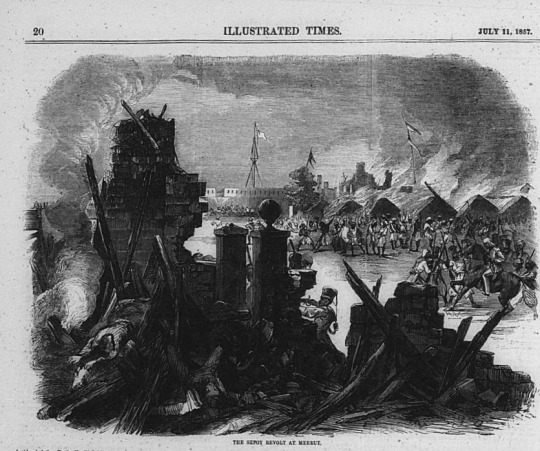
.. 10th May 1857 .. the great Indian rebellion .. the 1st war of independence against the British at Meerut .. the rebellion began in the form of a mutiny of sepoys of the East India Company's army in the garrison town of Meerut ..
Meerut is situated between the holy rivers Ganga and Yamuna ..
Thanks to its geographical importance, the fertile Ganga-Yamuna doab had been an important centre of human activities since the very early times of Vedic Civilisation.
From the medieval period onwards, the proximity of this city to Indraprastha (present day Delhi) helped it play an important role in the affairs of India.
With the capture of power by the British, Meerut became a major military centre. The aggrieved Indian soldiers of the British Army began their fight against the imperial powers in this soil on 10th May, 1857. They captured the control of the city in one day and marched to Red Fort in Delhi, which was considered to be the symbol of control over the whole of India. On their way, they were joined by the common people who shouted patriotic war cries. By the next morning, Red Fort had fallen into the hand of the freedom fighters.
..
Few pictures of India from 1857 ..
Lucknow .. 1857 ..

Calcutta .. 1853 ..

Taj Mahal .. Agra .. 1857 ..
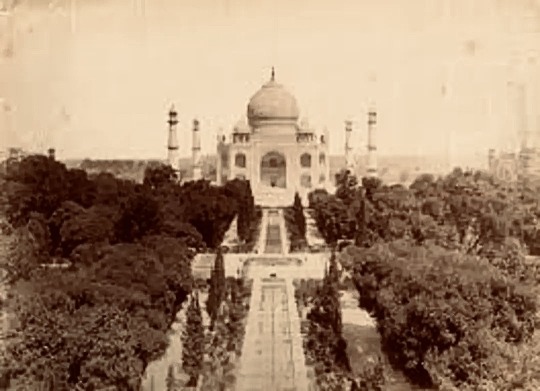
Jantar Mantar near Delhi .. 1858 ..
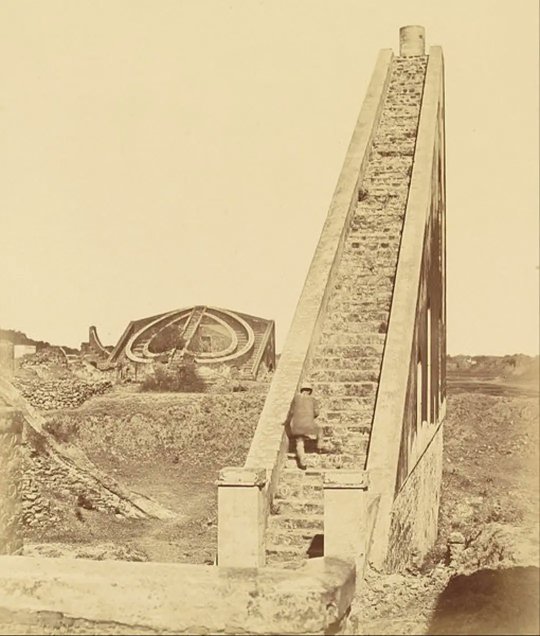
James Outram's Camp at Alumbagh, Lucknow .. It was occupied by Outram and his 4000 Soldiers After the 1857 Mutiny ..
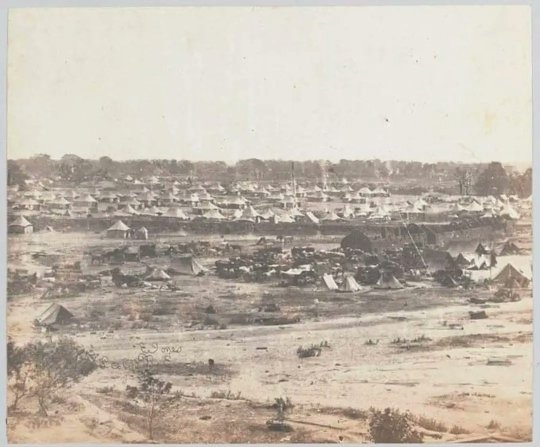
Humayun's Tomb in Delhi .. 1858 ..
See how the change has taken place .. this is the same location where we shot the song from UUNCHAI, the film of Sooraj Barjatya, pictures of which had been put up here at the Blog
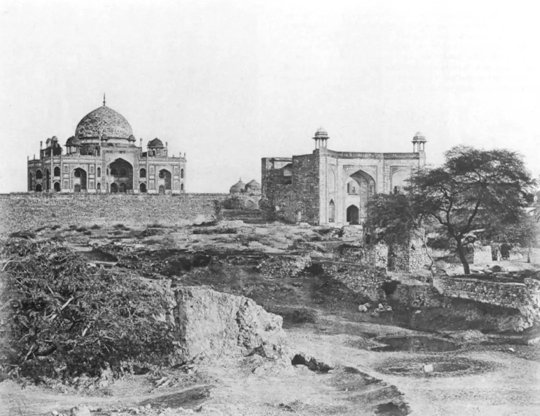
A Sikh cavalry .. Illustrated Times .. 1857 ..
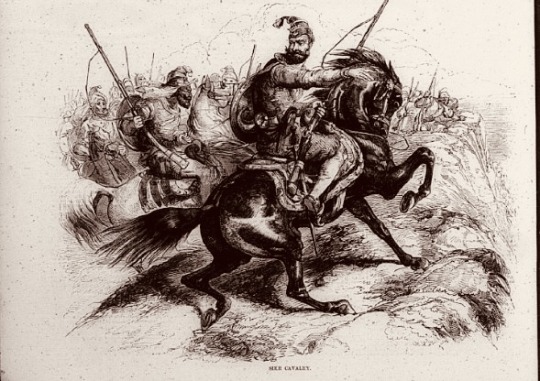
..
Jai Hind .. 🇮🇳🫡🕉️🙏🏻
Love .. ❤️🙏🏻
It has been a bit of a history lesson .. and after which it would be too severe to write anymore .. but simply to say , that the time at the Studio Saptaswar was visited after many an hour and days .. and the sonorous sounds for an upcoming film of Abhishek .. and of my own Section 84 , was I felt , in keeping with the moment and the story and the emotion ..

Amitabh Bachchan
100 notes
·
View notes
Text
The textile syndicate
This story is a request and it won't feel as inclusive, since readers nationality is Indian. With that said, if you still want read this have fun :D



You instruct your servants the moment you get out of the carriage. “Alright everyone, unload everything.” They instantly take out all the wooden boxes, many of them adorned with intricate designs. You take one look at the garments inside and give them a nod of approval.
‘Why did these Britishers hire me of all people? Surely they could find someone better’ You ponder.
But there is no time to waste. The grand Moriarty manor stands right in front of you. As you take a deep breath in, you put your right foot forward, officially entering the manor

“Moneypenny, do you want any style in particular?” Albert chimes. “Thank you for your concern, but I don’t know a thing about sarees.” With that, she crushes his chance for a conversation. To further show her discontent she puts a biscuit in her mouth, an indication she doesn’t want to talk further.
“Ah.” He grows silent. Albert doesn’t blame her for this behaviour. A mission to India takes at least two months of transport time. Obviously no person wishes to be trapped in a wooden hulled ship for that long. He quickly turns to William. “Brother, why did you call her out of all the saree producers?”
“Uhh…” William puts down his teacup. “No particular reason.” Albert’s eyebrows cross at his response.
“And you expect me to believe that lie? Please dear brother.” It was quite a peculiar situation, seeing the earl pout.
“There’s nothing to it really. Saree is an Indian garment, She’s Indian. Plus, she is the daughter of a well educated businessman.” He grabs a mini sandwich from the tiered cake stand
His reason was technically true. William put a lot of effort in finding you. After all, you’re a part of their mission. Y/n L/n hailed from a town called Kanchipuram, the Silk City of India. She had also spend 5 years of her teenage life in Dhaka, India, which is known for creating a very important fabric, Important because it plays a part in their mission.
“She’s here” Louis pops out of the doorframe of the tea room. “Great! Let's get to it.” With Albert’s command, the other two rise up.

Talking to your clients didn’t seem quite hard but what throws you off is the blonde man with the scar staring at you constantly. Although he has been helping your servants with the boxes, anytime this happens you start to talk with the other blonde haired red eyed man in the room.
“If it’s alright, may I ask why you want to purchase a saree in the first place? England's weather is not suitable for this in the first place.” A question lingers.
“My assistant is going to Calcutta on my behalf for a business trip. She would be attending a party behesting myself, so we thought it would be a nice idea to buy one.” Albert straightens up.
“Hmm…In that case I don’t think you should buy any of these sarees.”
This sentence rattles Moneypenny. “Why not?” She retorts a bit aggressively. ‘So all that browsing was for nothing?’ She thought. “You would be visiting a North-Indian household. My sarees are made in a south Indian style.”
That’s a good excuse. Truth to be told, you don’t want to sell your sarees to them. The Indians and nobles with no ties to the government have been your primary clients for…that fabric. Exposure of your work to high standing Britishers might scare your actual customers away.
“But Ms.L/n, you do have North-Indian styles in your inventory.” William speaks up. “Uhm I don’t.” You’re confused.
“Yes you do.”
“But I don’t???”
“Then what about the Dhakha Muslin?”
Oh no.
“The illegal fabric?” Moneypenny jumps from her seat.
Dhaka Muslin, an Indian made fabric banned by Britishers. Throughout history many famous figurines such as Marie Antoinette, Joséphine Bonaparte and even Jane Austen have worn and loved this Muslin. After colonisation, Dhaka Muslin became popular among female nobles, as it was a status symbol. However they didn’t know how to layer it properly. Dhaka Muslin is a transparent fabric, so thin some say it’s woven out of air. Without proper layering and pleating, wearing it can make you look naked. Thus, it was banned by Britishers. Weavers were forced to make garments out of cheaper fabric to get food on their table and cheap fabrics of England replaced this one quickly. All methods of reviving this fabric were almost gone until your father invested in the business. Even after being banned, the demand for the fabric still exists.
“This should get interesting.” Albert perks up.
“Excuse me Mr Moriarty but these are nothing but faulty accusations—” “Then what about this?” William shows you a piece of paper. A paper containing all the transactions with you and your previous clients. Worst of all, it’s written in your handwriting and has your signature.
Anger and fear blossoms upon your face.You knew it was a bad idea to be related to them. You knew Albert had ties with the military and yet you willingly signed up to this.
“Don’t worry Ms.Y/n, I don’t plan on showing this to the police.” Albert chums up.
What?
“Well that is if you comply.” William smiles and takes out a checkbook and a pen. “Dhaka Muslin is a highly sought after fabric in the black market.” He turns to his brother. “Did you know brother, it takes almost 16 steps to create it.” William continues writing. “That’s quite high.”
“Which is precisely why it’s hard to make. Even the cotton for it can only be grown on a specific land.” He looks at you.
“Overflood the market.” He swiftly tears off the check and hands it to you. “What are you planning?” You glare. “That is our business, you are in no place to ask for that. Should we want to reveal it, you’d know then.” Albert gets up from his seat and towers you. “We give you five months time to prepare and sell. If anything money related troubles you, call us.”
“Uh Lord Albert what about my saree?” Moneypenny looks up at the brothers as if nothing happened. “Just wear a gown. The party is hosted by an Englishman anyway” With that they leave the room, leaving you alone with the lady. “Don’t look at me. I didn’t even know they were planning something.” She gets going too.

“I should have expected this.” You drop the files on the table, creating a loud bang. Three months have passed by but you still don’t know why they’re doing this. The only reason you’re able to stand them is because of the pay. They’ve even overpaid you in some cases. But maybe, that should have been your second warning, another reminder to escape England. Today, Lord Albert Moriarty directly came to where the fabrics arrived and informed you the operation has to be done within a few weeks. You argued, bitterly, even shouting a few curse words in your mother tongue but his decision was final.
It’s odd timing that at the very same moment hundreds of buyers emerged for the muslin. From old-money manors to local tailors, everyone wants this fabric now. Police investigations have increased, leaving buyers at risk, but they still order.
“So much paperwork…” You mumble. This isn’t the time to complain. You grab a pen and start filling out the papers. Half an hour goes by and you can already feel the dark circles coming in.
“A break would help you, you know?” Your head turns in a flash and your eyes lock in contact with the blonde man.
“L-Lord William! S-Sorry for the mess, please, do sit.” Your hands grab onto all the paper on the table and quickly arrange them. “Please, Liam is just fine.” William moves, standing opposite to you.
He had visited you a multitude of times in your office. Once when you expressed your displeasure to plain English tea, he brought some chinese tea cakes to try out. Ehne you both tried it the concentration of the brew from said tea leaves of cake was so strong, both of you spat it out. Ever since then, the two of you have become very attached to each other.
He stared at you for a few seconds. “Your hair.” He briskly pressed his fingers on top of your head, smoothening the abrasive hair. You quickly use both your palms to flatten it out. “Pardon me.”
“No, pardon me. That was very rude.” He looks to the ground and quickly pulls out a box. “For you.” he shys away.
Inside it was a luminous golden ring. “A Vanki ring.” You immediately pick it up. A Vanki ring is a ‘V’ shaped ring usually worn by daughters of high priests or kings. “A retired Colonel named Moran told me Indian women commonly wear gold jewelry so…there it is.” His mouth turns into a straight line. You figured gift giving was William’s way of showing love but this was beyond what you expected. Vanki rings are not commonly known jewelry and finding a goldsmith in Britain to craft one is even harder….
He actually looks kinda cute.
“I know my brother's demands seem unfair, but time is really not on our side. And I know, you’re still quite clueless on why this is happening to you.” Your eyes still linger on the red gemstones. “We don’t mean anything bad, w-well the true reason is—” William goes silent.
“Why are you wearing it there?” He almost pales from shock. “Wear the ring where?” “on your ring finger!” He panics. “Vanki rings are usually worn on the ring finger. Plus, why did you Englishmen name it the ring finger if its purpose wasn’t for holding a ring?”
“That—UGH!” He covers his face with his palm, trying to hide his blush. “In England we wear a ring on that finger to signify…”William’s voice trails off.
“To signify what?”
“NOTHING. Good day.” With that , he slams the door to your office and leaves.

“My little brother did what?” Albert chuckles. “Yes! And he didn’t even give me a proper reason. what does wearing a ring on the ring finger mean anyway?”
“Nothing of importance.” Albert smiles calmly. “Please forgive William, he doesn’t mean bad.”
It’s the day before you sell all your fabrics to the people. Only one more day before you cut ties with these gentlemen. Albert had invited you to discuss plans but it suddenly turned to him drinking wine. “Why not try some?” He shows you a bottle. “It’s vintage.”
“Oh no no.” You apologise. “I don’t drink.”
“Scared of some dried grape juice?”
“Well alcohol addiction does run in my family so yes.” You lean back. “I don’t think I can convince you any further.” He puts down the bottle. “Are you sure? About the alcohol addiction.”
“Oh yes very much. My father had it. It’s the main reason why I’m in England.” This peaks his curiosity.Albert waits for you to give him an answer.
“My father was a great man.” you slid back further. “He loved my mother, he loved me…He always made sure to put us first before anything.” Your eyes lingered on the wine glass. “When my relatives pestered on marrying me early, he was the one who stood up against them and gave me an education. Father taught me all there is to his business. No one could argue that he wasn’t a good businessman but…” Your voice lowered.
“But what?” Albert took a sip. “But he was casteist. You see, I come from a line of priests. In India, people would call me a ‘brahmin’. In my country, being a brahmin has a higher status than that of a king. He did believe our family were somewhat spiritually higher but he never discriminated against anyone until he took alcohol. I don’t know what exactly happened to his mind.”
“He mistreated our servants and the weavers working for us, calling them ���untouchables’, giving customers different rates according to their birth and whatnot.” You sighed. “Even my mother had enough of him. Fights occurred a lot in the family ever since then.” Your voice hitched at the end.
“Then my mother left. She couldn’t handle him anymore.” You blinked rapidly to avoid tears. Albert noticed this and was ready to change the topic but you continued. “I wanted to leave him. But I didn’t have anything for myself. No money, no name. I was this close to giving up.” You gulped your saliva.
“Then I remembered I was one of the few people in my family who knew how to read and write English. I was also responsible for writing up contracts and had spare copies of everything. I even had the records of the illegal transactions. Being such a large amount, I took the files directly to the British officials in Dhaka. My father was arrested and the officers were very pleased with my confession. They decided to pardon me even though I was involved in the business. The officers gave me a heap of cash and told me to start a life anew. But, I just couldn’t leave the weavers. They were completely dependent on my father, that’s why they tolerated him in the first place. So I took the risk, hired them under me, set up a new area for business and came to England in the name of ‘expanding my business’. ” You close your eyes and lay back your head after the confession. No wonder why you were frightened to the core when William showed your records. You thought Karma caught up and was about to do the same thing you did to your dad.
“I’m sorry for being emotional.” All you could do was stare down in shame.You told everything to a man you truly don’t know. You didn’t want to know what he was thinking of you at the moment. You were so caught up in ranting, you weren’t even sure you narrated the events correctly.
“No I’m sorry for making you talk about this…” SIlence suffocated the room.
“You and I…Are not so different.” He smiles. “My father was a little like yours.” “Really?” “Yes. But minus the ‘great’ part and the ‘loving my mother’. Everything else is just the same.”
“Oh.” A small sound just left your lips. “I too did something drastic in order to get away from him.” You finally turn up your head to see him, and was greeted by something shocking. His eyes were red. So were his under eyes. He cried.
“Do you regret it?” You asked hesitantly. “Not much. But I wish he were a better man. It wouldn’t have come down to that if he had respected my wishes.”
Tranquility filled the room again. Abruptly Albert got up. “How about we go horse riding? That should ease both our minds.”
“In the middle of the night?” You raise an eyebrow.
“Why not? Unconventional times always lead to great discoveries.” He grinned.
“Come on then.” He holds out his hand for you to grab.
The stable was devoid of any person, field with nothing but hay and horses. “Why don’t we ride this one?” He points the black horse.
“Oh it’s alright I know how to ride horses, no need to go on the same one.” You look around. “I’ll ride the brown one.” You point at it.
“...Very well then.” Albert was disappointed. He takes out both of the horses.
The blades of grass shimmer dimly at the moonlight. The wind blows cold, causing goosebumps around your arms even with a coat. Albert assists you in climbing your horse and climbs his with ease.
“I’m guessing your father used to take you on rides?” You nod to his question.
Both of you do a swift flick on the reins and the horses are out running. The seemingly cold wind feels warm to Albert after he hears your giggles.
As you further go down the field, the horse starts to go faster. Unbeknownst to you, the horse wasn’t properly trained. At one point you pull on its rein to stop it, but the untrained animal runs faster instead. It starts to jump, trying to push you off its back. Albert wasted no time to rush to your aid. “Y/n!!”
You try with all your might to stay on it, but finally it pushes you off, leaving you tumbling to the ground.
“Y/n!” He screams at the top of his lungs. At a panic, he tries to get off the horse while its moving, stumbling while running towards you. “Oh my goodness, are you alright?” You blink rapidly, seeing two versions of Albert.
“Can you hear me? Oh dear lord.” He quickly removes one of his gloves. “Forgive me for touching you without gloves but we must put your health above your reputation.” Albert uses his two fingers to check your pulse on your throat.
“You don’t seem injured in any manner but…Let’s get you a doctor.” Within a split second he lifts you up with ease, carrying you back to the manor.

“Is your ankle fine?” William passes you a slice of cake. You softly touch over the bandages of your leg. “It’s better than before.” You smile.
The mission was completed successfully. Apparently the reason why they needed to overflow the market was because a nobleman used slaves to enlargen his fabric empire. Your marketing had given them enough time to corner him to ‘settle the dispute’. You did want to ask why they did this but seeing the fact that they had money and power to take down such an elite man, you don’t think its best to ask. Infact, you feel queasy interacting with them now.
“Ms. Y/n.” Albert calls you. “You seem to be very passionate about reviving the fabric of your nation. Why don’t we continue this deal further? Let’s talk about this at dinner… just the two of us.” He tries to avoid eye contact.
You’re still oblivious to his advances. “Oh no thank you, I—”
“NO!” William shouts with unyielding determination. This situation was very unpleasant and unprecedented. Never did William guess that his own brother would be in love with his love.
He has to do something now.
“Brother this is not possible…” He replies sternly. After regaining his composite he continues. “...Because I’ve already invested in her ‘business’.”
“Oh and tell me, by what means did you ‘invest?” His usually monotone voice takes a mocking turn.
William almost wants to laugh at his brother's behaviour. He had never seen him being so childish. “By using this” He gently picks up your hand and shows him the ring.
“I’ve heard Indian women wear gold as an investment.” He continues. “And I say, this is quite a steep investment.” He looks at his brother slyly.
“A ring on the finger means nothing if the other doesn’t understand its true meaning. ” He spat. “Besides, if you’re really ‘married’ to her, have you initiated anything???? Me and Y/n have already went horse riding…as spouses do.” He smirked.
Marriage??? They were trying to court you?
“Y/n.” Both of them call you at the same time.
Whom do you choose?
#William#
#Albert#
#???????#
#?!?!?!!?!?#
#moriarty the patriot#yuukoku no moriarty#albert james moriarty#william james moriarty x yn#louis james moriarty#mtp william#william james moriarty#william james moriarty x reader#mtp louis#mtp albert#albert james moriarty x y/n
20 notes
·
View notes
Note
I met this man at a bar recently and he was absolutely gorgeous. He’s here shooting a movie but otherwise wasn’t into me at all. Could you possibly make me into an even bigger hotter more muscular movie star so that he’ll notice me and want to get together?
Well… You're not particularly good-looking or charismatic now… No wonder the first contact wasn't particularly successful. But what do you expect with your baggy sweatshirt and ill-fitting jeans?
After the nasty rebuff you received, you're sitting alone at the bar again, looking into your… Whiskey? When did you order a whiskey? You notice that two girls in the corner keep looking over at you, whispering, looking and giggling. One of them gets up and walks towards you. You straighten up, smile at her, she turns bright red, giggles and asks if she can take a selfie. She has an adorable Indian accent. And you reply in Hindi that it would be a pleasure and an honor. She takes the selfie, gives you a kiss on the cheek and runs to her friend, giggling. You finish your whiskey and wave the bartender over to pay. He replies that it would have been an honor to serve you and that the drink is on the house, of course. And a second one if you like. Your crush looks at you questioningly. You accept the second whiskey with thanks and toast the actor. He toasts back and frantically thinks about how he knows you.
It's getting warm in the bar. You unbutton two buttons on your shiny shirt. Like the trousers, which are made of a similar fabric, the shirt fits like it was painted on your body. The bar is getting fuller. Of course, many guests are whispering about your crush. But even more stare at you, want a selfie or ask for your autograph. Many of your fans are glowing-eyed and black-haired. Lots of Indians. Your crush asks you if you're an actor too. The Indian beauty who is taking a selfie with you, pretending to give you a kiss, almost collapses with laughter. She opens Instagram and shows your crush an Instagram account. Your Instagram account. 58 million followers! He turns pale. Very pale. Your skin turns a deep brown. You answer his question with a heavy Indian accent. Yes, you're an actor too. Bollywood is productive. And you are one of the biggest stars. Four to six films a year. And each one is a box office hit. Your fitness videos? Top sellers! Your own fashion collection? A must-have in Delhi, Mumbai and Calcutta. And now also in London and Berlin. You smile your hundred-million-rupee smile. It leaves him speechless. But the bulge in his pants speaks its own language…

For the two young men who ask for a selfie, you throw yourself back into the cool macho pose that half of India loves you for. You give the bartender a 100-pound note as a tip, put on your leather coat and tell your colleague "Savoy, Charlie Chaplin Suite. Ask for John Rolfe". You don't need to look around to know that he's rushing to pay and grab his jacket. Tonight will be a close exchange between Hollywood and Bollywood.
Pic found @maxx-magnum
115 notes
·
View notes
Text

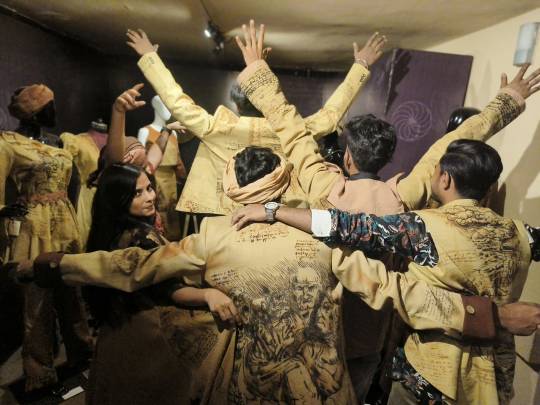


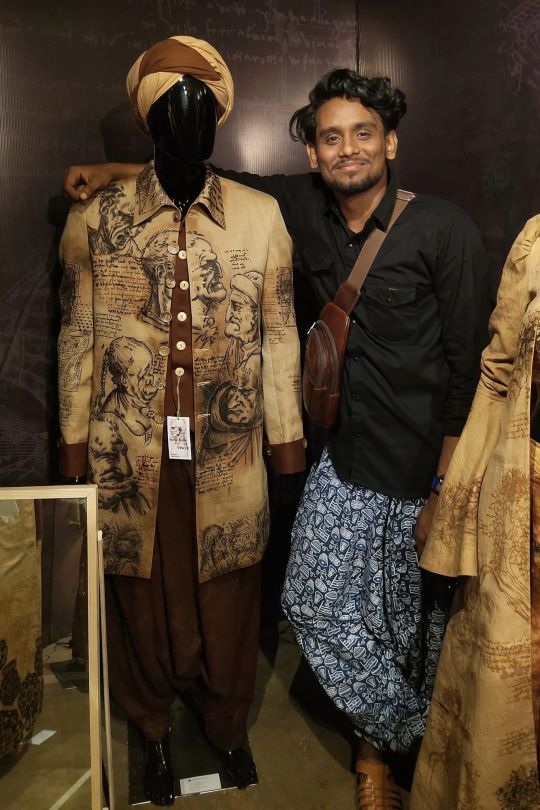




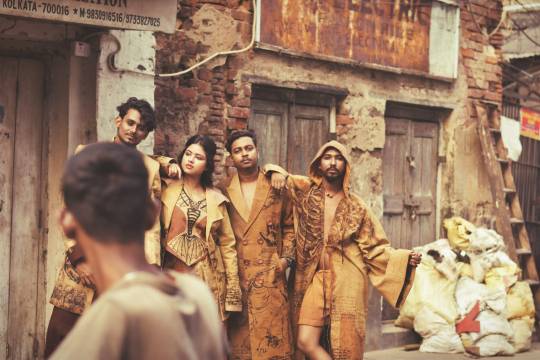
Students of the textiles department in the Govt. College of Art & Craft, Calcutta, India have recently come out with a lovely project called Da Vinci Notebooks. Using natural dyes and kalamkari technique they designed a very attractive collection of clothes. Here they are, demonstrating their creations.

24 notes
·
View notes
Note
for the lyrics thing: “there’s something in the way you lay / that makes the dead switch graves / you take your leave” from Jericho. is “you lay” a euphemism for sleeping around (so the person is so sexually active that they make the dead roll in their grave)? or is it saying that the person is so wonderful that they can even move the dead? i’ve never been able to figure it out so i’d love to hear your thoughts!
I was hoping someone would ask about the Two ep! Just my luck, thank you anon <33
In the UK, and in America as well I'm pretty sure, "lay" is used as slang for having sex with someone, so you're right on that part, definitely. However, the line "there's something in the way you lay" brings both negative and positive connotations to me. He's saying 'there's just something about you. The way you look like that.' There's either a sense of stillness and serenity with it; a calm brought about by the way they lay, possibly asleep next to their partner.
On note of the next line, which I'll talk about in a moment, a large amount of people are known to 'sleep like they're dead', and others note that having Sleep Paralysis feels like death. The Dead are often confused for the sleeping as well, as long as they don't have any noticible abnormalities.
Even though two is quite sexually charged, I mean hey, take a look at Nazareth, I'd like to go with it being they're just so wonderful, or, in the least, appear to be so.
"Enough to make the dead switch graves" Is a stupidly powerful line. Whoever this is is just asleep, or sleeping around, and they have enough authority to make the dead switch graves.
In addition to this, a typical euphemism you may hear is 'make the dead roll in their grave'. It's one thing to do something so disgusting that you make the dead roll around, but this is something enough for these corpses to get reanimated, dig their selves out, get up, walk to another grave, and switch. This person's mere existence is potent enough that it causes the deceased to get up and leave.
It gives the vibe of a shift in the natural order of things, if that makes sense.
Plus, plus, in Islam (I know, I'm back at the religion again, bare with me lads), after a person has died, it is believed they will rest in their grave until The Day Of Judgement where they will be full body resurrected and either be taken to Paradice or Hell. Aka, the corpse will be reanimated to be eternally judged. There's also a similar idea in Christian theology; some denominations believe they die and either straight up go to Heaven or Hell, or will wait in their grave to be reanimated and judged on Judgement Day. Just something to think about.
Further, Jericho is the 'oldest city in the world', and makes an appearance in the Bible and the Qur'an; Israelites conquer the city and destroy it's protective walls. Nazareth was the home of Mary in the Bible and also where she received Annunciation. Calcutta is the old name for the capital of British India (now called Kolkata). Overarching theme of big cities with violent histories.
Lastly, we have "you take your leave". It's sung in a very final tone, if you get what I mean. Basically a 'you leaving isn't a big deal...but it means a lot to me. You've hurt me; again.'. There's not much to analyse here; it's simple and it's final. Whoever this is is gone, either 'dead' and so thoroughly disgusted/angered by Vessel that they've reanimated themselves and walked off, and Vessel will spend his time dissecting old encounters and feeding off of whatever he can salvage.
On the note of 'death', a bed can also be a grave for some people, either a metaphorical one or a literal one.
#again thank you for this one anon!#I'm sorry I went off on an analysis tangent from your original ask 😭 I hope I didn't go overboard#would love to hear everyone's ops on this one though! Definitely an interesting thought that didn't run though my head originally#mel's asks#anon asks#mel's rambles#sleep token#st#sleep token analysis#lyric analysis#two#two (ep)#two ep#Jericho#jericho (song)
25 notes
·
View notes
Note
No no you cannot just post that 'silly little hc'??? And not expect me to ask you about it??? I need the rest of your lecture notes ASAP lol
✿ — yesss! haha! i was really, really hoping that someone might be intrigued enough to maybe ask me about this further; it's honestly so near and dear to my heart, especially since diving deep into storytelling and character development is a massive passion of mine! :)) for a little bit of context, this ask is in reference to >>this<< post i made briefly going over my whole hc for the two ep! :D
anyways!! this post is gonna be a massive theory/headcannon post that will be focusing on the sleep token ep, two, and the first song, calcutta, as well as my hc that these songs are quite literally the basis for ii's backstory! :D considering that nazareth and jericho are two of my favorite songs in all of sleep token's discography, i'll most likely address those two songs in a separate post! :) for now, i just wanna throw these thoughts out there, haha!
✿ — TWO.
well, first of all, where does this hc originate from? i'm so glad you asked! :D this hc stems from the fact that every song from this ep are the only songs on spotify to list a 'vessel ii' as a composer alongside 'vessel'. to my knowledge! calcutta, nazareth, and jericho are the only songs in the entire sleep token discography that lists a 'vessel ii' as a composer alongside 'vessel' or 'vessel 1'. naturally, we can assume that this is our one and only ii! :)
and, of course, the ep is named 'two'! :) yes, of course, this ep is the band's second compilation of music, so the name is a little bit on the nose, haha! but i also like to think — in the same vein that this ep is ii's backstory — the ep one is vessel's backstory :) which, who knows, haha! maybe i'll do my own narrative analysis of the one ep after this >:Dc
✿ — CALCUTTA.
↳ tw + cw : discussions of death, jealousy + possessive thoughts.
✿ — first up on the ep is calcutta! :D gosh, i do so love this song, haha! but, first of all, what does calcutta mean?
✧ — as a general idea, calcutta is actually the largest city and the capital in west bengal of india! it's a bit of a melting pot of sorts, especially for practicing different religions such as hinduism, muslims, and, of course, christianity. though, since 2001, the city has officially changed its name to 'kolkata'.
↳ another interesting thing that i discovered while doing some extra research for this post is in regards to the etymology behind the name 'kolkata'! :D the word is initially taken from the name 'kôlikata' which was the name of one of three villages in the area that merged together to form the city of kolkata. in regards to the etymology of the name, 'kolikata' is thought to have been a variation of the bengali word 'kalikkhetrô' which translates to 'field of kali'.
↳ okay, so!! interestingly enough, kali — also known as kalika — is a prominent figure in hindu mythology and religion! kali is oftentimes worshipped as a divine protector and as one who bestows liberation; she is associated with aspects of mortal life such as time, change, creation, power, and!! the most fascinating bit!! she is also associated with destruction and death. this little tidbit of information becomes even more interesting when considering the next song featured in this ep, nazareth. but!! back to calcutta! :)
✧ — additionally, there was also a dungeon stationed in fort william, calcutta in the 1700's that held british prisoners of war after the fort was overtaken in a seige. the dungeon was known as the 'black hole of calcutta', and a written account from one of the soldiers that was imprisoned there detailed brutal conditions that were so inhuman and cramped that they had its prisoners dying from suffocation and heat exhaustion. to support this reference, in the opening shots for the calcutta music video, vessel is shown literally crawling out of an unknown crevice, presumably a hole. haha! i don't know why i worded that so weirdly, but you get the point! :)
✿ — these possible little sneak-peeks of the possible history behind the name of this song are so fascinating to me, haha! but, what about the actual song?
✧ — of course, this is all up my personal feelings and interpretations about this song, but i like to think that calcutta is a song about hopelessness and about experiencing a growing sense of despair that can only come from loving another person that you cannot obtain. as much as i would love to break this song down lyric by lyric and piece by juicy little piece, i think i'm going to focus on specific lyrics and sections that really resonate with me! :D ...which is apparently almost the entirety of the song, haha!
' i am caught, tangled in // wrapped and quartered '
↳ when i first heard this lyric, i was immediately reminded of the black hole of calcutta. to be caught, to be tangled in, only to be executed in a brutal manner that was typically reserved only for individuals who had committed high treason against the kingdom of england. when dissecting it, it's an absolutely morbid and grim line that opens this entire ep!
' and i ache for your eyes and the way you breathe // and i wake, say your name // and i wake, say your name '
↳ personally, these lines scream!! unyielding yearning + unrequited love. especially considering that this line follows after vessel singing about how 'for just a moment // missing pieces find me'?? it feels like every slightly good emotion or feeling that's described in this song is almost immediately crushed by a haunting reminder of how temporary that sensation is.
' you are more than warm belief // melting skywards '
↳ something that i find to be one of the more interesting little references in this ep is that two of the three songs hold roots in christianity + and even calcutta holds a lot of religious symbolism and ties to hinduism. this line feels like religious symbolism being directed to a mortal body—one i can only assume might be vessel. this happens a lot throughout the course of this ep, where there are multiple lyrics that hold heavy references to religious symbolism and/or religious imagery. but there's something so distinctly mortal about how these lyrics are executed, that associating these lyrics with sleep just feels completely incorrect. at least to me!! a gentle reminder that this is all my own person headcannon :)
↳ i'd like to specifically bring your attention towards the terminology that's used in these lyrics! i believe that ii saying that vessel is 'more than warm belief' is ii saying that vessel is more than what sleep is trying to make of him; he is his own person, his own identity that is more than just his devotion to sleep. now, my favorite part is this next bit! 'melting skywards'. sleep token is known for their constant references to water as a form of symbolism, and i think that it's no different here! this might be a bit of an extra long stretch, but i think that ii is worried that vessel's 'warm belief' towards sleep will melt him—ii is worried that vessel's devotion might quite literally be the death of him, or at least the death of his identity, instead choosing to leave ii behind and become completely enveloped in sleep's identity.
' more than silence broken // i'm whole again // for just a moment // 'till the morning comes '
↳ this line feels like a small snippet into vessel's and ii's relationship together, specifically their bonding through music as their time together is 'more than silence broken'. it's through these moments in time where ii feels whole again with vessel and the music that they've made by his side.
↳ i think the most interesting part of this line is the lyric ''till the morning comes'. my favorite thought behind sleep's and vessel's relationship is that sleep is the dominant force during the night, whereas vessel is the dominant side during the day. however, considering that sleep — especially during this era of sleep token's music — is considered a widely negative and toxic personality in their relationship with vessel, wouldn't ii look forward to the daytime?? a time of the week where sleep isn't such a domineering presence in both his and vessel's life?? well! i like to think that this song takes place early in vessel's borderline infatuation with sleep, so even the hours of daylight would be spent with vessel obsessing over sleep and possibly ignoring his relationship with ii in favor of his relationships with sleep and his own personal lover—more on this young lady next!! >:Dc
' oh, she said you'd better believe it // i said you don't know // oh, you said you'd better be there // i said you don't even know '
↳ now, we've finally come to a relatively popular theory in terms of vessel's life before sleep's influence—the possibility of his partner! :) now i will say that i do agree with the theory that vessel did have a longterm partner before sleep and the other vessels hehehe--! especially when considering the music videos for jaws, the way that you were, and possibly even the love that you want and the couple of feminine actors that make an impactful and/or reoccurring appearance in sleep token's music videos!
↳ okay! time to break this puppy down >:)c there are three separate sets of pronouns here — 'she', 'you', and 'i' — so let's identify who might be talking! i believe that 'she' is referring to vessel's partner, 'you' is in reference to vessel, and 'i' is ii. i believe that this verse establishes ii's jealousy towards vessel's partner — something that sleep will weaponize against them both in nazareth.
✧ — ' she said you'd better believe it // i said you don't know ' : to me this feels like vessel's partner is trying to address ii's jealousy, affirming that they are here to stay in vessel's life whether ii likes it or not + ii dismissing them, 'you don't know'.
✧ — ' you said you'd better be there // i said you don't even know ' : this feels like borderline damage control to me, which would make sense if we consider this first half to be from vessel's pov. vessel can see the animosity between ii and his partner. when vessel says, 'you'd better be there', i think he's referring to ii's presence in his life. you'd better be here, you'd better stay with me, etc. etc. and when ii replies, 'you don't even know', i think this is said with the opposite intentions of when ii was dismissing vessel's partner. here, i think ii is almost comforting vessel; his intentions are more genuine when he's addressing vessel, while remaining more hurtful when regarding vessel's partner. i think that this is where sleep finds ii.
✿ — to put it all together, i think that ii cherishes his time spent with vessel during the night, because it's just them! no partner and, at this time, sleep's influence is still small in vessel's life. it's just them. but his attentions are split up — it's being wrapped and quartered — between being with vessel, tolerating his partner, and beginning to catch the eye of sleep themselves. but, in these moments, when it's just ii and vessel together in the dead night, ii feels whole. during the day, vessel seeks out his partner, but in the night, vessel seeks out ii—his missing pieces find him, even for just a moment. however, even in the morning, when vessel moves on, ii is still waking up saying vessel's name. in conclusion, while sleep and their influences might be vessel's—vessel is ii's calcutta; he is ii's prison that ii willingly crawls back into every night, just to have a moment where it is just the two of them. and i think that it is in this moment in time where sleep extends their influence to ii, intending to weaponize ii's jealousy and possessive thoughts to bring vessel closer to sleep.
✿ — and that's it! :D that's my analysis of calcutta from the ep, two! :)) as a friendly reminder, this is just my own interpretation of the lyrics through a strictly narrative lense :) i don't think this could be actual sleep token canon, haha! i just think that this would make a very fun and interesting story for my own selfish reasons, haha! i'll still probably make another post for nazareth and jericho, but please feel free to let me know what you think of this silly little analysis in the mean time! :D i always love hearing other people's opinions and thoughts on these sorts of topics, haha!
#god i go so hard for these posts#i LOVE questions like this haha!#calcutta my beLOVED UGH#spoiled thoughts#spoiled writing#spoiled theories#??? OH??? POSSIBLE NEW TAG UNLOCKED?? haha!#sleep token#sleep token theories#sleep token analysis#music analysis#sleep token band#sleep token vessel#vessel#sleep token ii#ii#vessel ii#sleep token sleep#sleep token two#sleep token calcutta#ooc leaf#hc where ep two is vessel two's lore
15 notes
·
View notes
Text
Gulf migration is not just a major phenomenon in Kerala; north Indian states also see massive migration to the Gulf. Uttar Pradesh and Bihar accounted for the biggest share (30% and 15%) of all Indian workers migrating to GCC1 countries in 2016-17 (Khan 2023)—a trend which continues today. Remittances from the Gulf have brought about significant growth in Bihar’s economy (Khan 2023)—as part of a migrant’s family, I have observed a tangible shift in the quality of life, education, houses, and so on, in Siwan. In Bihar, three districts—Siwan, Gopalganj, and Chapra—send the majority of Gulf migrants from the state, mostly for manual labor (Khan 2023). Bihar also sees internal migration of daily wagers to Delhi, Bombay, and other parts of India. Gulf migration from India’s northern regions, like elsewhere in India, began after the oil boom in the 1970s. Before this time, migration was limited to a few places such as Assam, Calcutta, Bokaro, and Barauni—my own grandfather worked in the Bokaro steel factory.
Despite the role of Gulf migration and internal migration in north Indian regions, we see a representational void in popular culture. Bollywood films on migration largely use rural settings, focussing on people who work in the USA, Europe, or Canada. The narratives centre these migrants’ love for the land and use dialogue such as ‘mitti ki khusbu‘ (fragrance of homeland). Few Bollywood films, like Dor and Silvat, portray internal migration and Gulf migration. While Bollywood films frequently centre diasporic experiences such as Gujaratis in the USA and Punjabis in Canada, they fail in portraying Bihari migrants, be they indentured labourers in the diaspora, daily wagers in Bengal, or Gulf migrants. The regional Bhojpuri film industry fares no better in this regard. ‘A good chunk of the budget is spent on songs since Bhojpuri songs have an even larger viewership that goes beyond the Bhojpuri-speaking public’, notes Ahmed (2022), marking a context where there is little purchase for Gulf migration to be used as a reference to narrate human stories of longing, sacrifice, and family.
One reason for this biased representation of migration is that we see ‘migration’ as a monolith. In academic discourse, too, migration is often depicted as a commonplace phenomenon, but I believe it is crucial to make nuanced distinctions in the usage of the terms ‘migration’ and ‘migrant’. The term ‘migration’ is a broad umbrella term that may oversimplify the diverse experiences within this category. My specific concern is about Gulf migrants, as their migration often occurs under challenging circumstances. For individuals from my region, heading to the Gulf is typically a last resort. This kind of migration leads to many difficulties, especially when it distances migrants from their family for much of their lifetime. The term ‘migration’, therefore, inadequately captures the profound differences between, for instance, migrating to the USA for educational purposes and migrating to the Gulf for labour jobs. Bihar has a rich history of migration, dating back to the era of indentured labor known as girmitiya. Following the abolition of slavery in 1883, colonial powers engaged in the recruitment of laborers for their other colonies through agreements (Jha 2019). Girmitiya distinguishes itself from the migration. People who are going to the Arabian Gulf as blue-collar labourers are also called ‘Gulf migrants’—a term that erases how their conditions are very close to slavery. This is why, as a son who rarely saw his father, I prefer to call myself a ‘victim of migration’ rather than just a ‘part of migration’. It is this sense of victimhood and lack of control over one’s life that I saw missing in Bollywood and Bhojpuri cinema.
— Watching 'Malabari Films' in Bihar: Gulf Migration and Transregional Connections
#bhojpuri indentured history#malayalam cinema#bihari labour migration#gulf migrant labour#malayali labour migration#bollywood cinema#bhojpuri cinema#nehal ahmed
22 notes
·
View notes
Text
Hanukkah has always been my favorite Jewish holiday. I love all of it: Friends and family gathering together, watching children open their presents, cheery songs to sing when lighting the candles, the celebration of triumph over evil and the opportunity to eat fried food and happily justify it. Of course, no Jewish holiday is complete without each family’s edible traditions.
Our family are Bagdadi Jews from Bombay and Calcutta, and have wonderful culinary traditions from Iraq and India for every Jewish holiday. For example, cheese sambusak are always served to break the Yom Kippur fast, and leek fritters are always served at our Rosh Hashanah seder. On Hanukkah, we enjoy all sorts of delicious fried food, from latkes and donuts to zalabia; however, I am always on the lookout for something new to add to our repertoire.
My Aunty Ruby who grew up in Calcutta, India recalls being taken as a child by her parents to KC Dass, a sweet shop close to where they lived, after Passover to have gulab jamun: a small, milky donut which has been deep-fried and soaked in cardamom and saffron syrup. She said they would dream about the little creamy treats all Passover, and would count down the minutes until they could eat them.
This got me thinking that they would make an amazing addition to our Hanukkah table: They’re fried, to symbolize the oil lasting eight days; they contain dairy, to celebrate the heroism of Judith, slayer of the general Holofernes; and they’re soaked in syrup — well there doesn’t need to be a reason to eat anything soaked in syrup!
Gulab jamun is one of India’s most famous deserts, though it was introduced by the Persians around 500 BC. The word “gulab” is derived from the Persian words “gol” (flower) and “ab” (water), which refer to the sweet’s rose water-scented syrup. Interestingly, gulab jamun is commonly served at Diwali, the Indian festival of lights, which, much like our own festival of lights, Haunkkah, celebrates bringing light into the world and good triumphing over evil.
4 notes
·
View notes
Text
Amrit Thoughts: Revisiting
Alright if anyone read my previous post about Amrit, you'd know that I said I wasn't feeling it. I'm almost done with his route (I'm on the epilogue episode, waiting on a DR cause I ain't spending no more diamonds. He expensive), and I think I may want to retract my statement. I think that Amrit is a man that is deeply steeped in the environment that he grew up in--which is the Dozen. So he believes in hierarchy, nobility, and family duty. For someone that is so dedicated to the Dozen and Kali, I think that his only true love could ever be Amala (while for Amala, based on the paths she chooses, her true love could literally be anyone). Because for Amrit, there is only one path for him, which is leading Calcutta and serving Kali, and it's the path that he is deeply devoted to. It was initially sad to me because when compared to someone like Ratan or Killian, who (based on the amount of points you have) would love Amala regardless of the side she chooses, it seemed like his love was conditional. And I'm a stickler for unconditional love. I thought that on the ROG path, maybe Amrit would think about leaving India with Amala and starting a new life, but on further thought, that doesn't make sense with his character. He is very dutiful to his family, to the Dozen, to his country, and so I understand why he'd feel betrayed if Amala rejected any of it (because it'd basically be her rejecting a large part of his personhood). He'd need to be with someone with similar interests. So, I think that his love for Amala is as unconditional as it gets for him. Yes, his interest in her was piqued because he knew he was promised to her, but it was no requirement for him to fall in love with her. He did all that on his own. And it's obvious that he loves her for who she is, no matter how crazy she gets. So. All this to say, I retract my previous statement! I misunderstood him.
#romance club#kcd rc#kali call of darkness#amala basu#amala khan#even though I don't like the thought of a canon li (for the mc)#I think that amala is amrit's canon li LMAO#I love revisiting all the LIs I initially disliked and giving them a chance to try to understand them.
13 notes
·
View notes
Text
The Jewish Bollywood Star: Esther Abraham
She was India's first female film producer

Esther Abraham was a Jewish Bollywood superstar and the first female film producer in India. She was a proud observant Jew even while shaping modern Indian culture.
Esther was born in Calcutta in 1916 to an Orthodox Jewish family. The Abrahams were Baghdadi Jews who had emigrated from Iraq in the 19th century. In school Esther excelled academically and athletically. She was a talented hockey player with a roomful of trophies. Esther was also an artist who attended Cambridge University after high school and majored in art.
After university, Esther became a kindergarten teacher at a Jewish school in Calcutta, but she yearned to be a performer. Her first job in the entertainment industry was as a dancer for a silent movie theater. Esther’s job was to entertain the audience during a pause in the film while the reel were changed.
Many members of Esther’s family were talented musicians and performers. She went to visit an actress cousin in Bombay who was appearing in a theater production. The director noticed tall, beautiful Esther and gave her a screen test.
Esther did so well on the test that she soon appeared in her first movie, Bhikaran, in 1936. Around this time she was given the screen name Pramila. Audiences fell in love with Pramila and she quickly became one of the most famous actresses in India. She also worked as a model and appeared on many magazine covers. In 1947, at age 31, Esther won the first Miss India contest – while pregnant with her fifth child.
At that time in India, the movie industry was controlled by a handful of extremely wealthy producers who exploited their actors and crew members and paid them only a measly salary. Esther Abraham decided to change that. She defied the studio system by becoming the first female producer of Bollywood feature films. Esther formed her own production company, Silver Productions, and produced sixteen feature films. She treated her cast and crew with respect and paid them well.
Esther starred in 30 films. In addition to being an actress and producer, she did her own stunts and worked as a stunt double for other performers. Esther also designed her own costumes and jewelry for every production.
Famous for her enchantingly beautiful eyes, audiences didn’t know that her eyesight was very poor and she did dance moves by counting the steps. Audiences also were likely unaware that she was Jewish – and probably wouldn’t have cared. Unlike so many countries with Jewish communities, India has no history of antisemitism.
Esther’s daughter Naqi Jahan was crowned Miss India in 1967, and they are the only mother and daughter who both won the title. Her son Haidar Ali is a successful Indian actor and screenwriter. Haidar described his mother: “A woman who was gifted by God with internal power and strength… she magnetized power…. One the home front she kept us together [clenching his fist] like this.”
Esther Abraham appeared in her last film in 2005, at age 90, playing a grandmother in the movie Thaang. She died a few months after its release. Until the end of her long life, Esther remained a practicing Jew. Her funeral was at the Maghen David synagogue, and her son Maurice read Psalms in Hebrew. Esther was buried in the Jewish cemetery in Mumbai.
For entertaining audiences for seventy years, and for being the first female film producer in India, we honor Esther Abraham, aka Pramila, as this week’s Thursday Hero.
63 notes
·
View notes